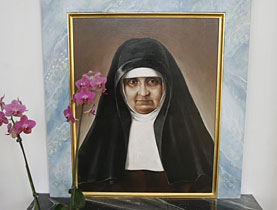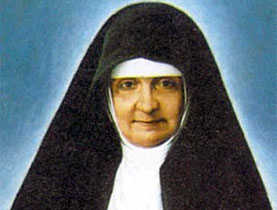Pope honours saint who was “one of us”

Hundreds of Swiss faithful mingled with pilgrims from Colombia in St Peter's Square in Rome on Sunday, for an event of a kind most will never experience again.
They were there to see the pope canonise the first female Swiss saint in modern times, Sister Maria Bernarda Bütler, who worked with the poor and dispossessed of Latin America.
Bütler was one of four figures being raised to sainthood; the others came from India, Italy and Ecuador.
“May their examples give us encouragement, their teachings give us direction and comfort,” said the Pope in his sermon.
The service spoke of the new Swiss saint as “a shining example of a biblical woman: strong, intelligent, mystical, a true master of spirituality and an outstanding missionary”.
Latin America
Bütler was scarcely known in Switzerland when she was beatified – the step before sainthood – by John Paul II in 1995. Her name started to become more familiar in March, when the date for her canonisation was announced.
Her fame comes from her work in Ecuador and Colombia, where she founded an order of nuns which still exists today throughout the continent as well as in Switzerland and Austria.
“She is very well known in Latin America,” Walter Müller, spokesman for the Swiss Bishops’ Conference told swissinfo.
“In [the Columbian city of] Cartagena, you’ll find her portrait in buses, taxis, offices, everywhere. In these Latin countries it’s a bit like the early church, where popular veneration was what made saints.”
Numerous schools and hospitals bear her name, and as soon as she died in 1924 pilgrims started visiting her tomb.
No-one can be declared a saint unless they have performed a miracle. The Vatican took 50 years to examine two alleged miracles, finally recognising them in 2007. This opened the way to canonisation. One was the curing of a brain tumour in a two-week old baby, and the other a lung disease in a doctor.
One of the Colombian pilgrims present in Rome on Sunday is convinced that she healed him too, when he thyroid fever had left him partially paralysed.
“My mother asked her to help me, and she enabled me to walk again perfectly. For me she has always been a saint,” he told journalists.
The Swiss Bishops Conference issued a statement welcoming the canonisation, and the chance it provided to build a special relationship with the church in Colombia.
A rare occasion
“Canonisation holds up one person as an example, and reflects the pride of a whole people! If there is so much talk about it in Switzerland, it’s because this first female saint is undoubtedly one of us,” Albert Longchamp, a Jesuit priest and former editor in chief of Echo magazine, told swissinfo.
Sunday’s ceremony was the first time that a Swiss had been canonised since 1947, when the 15th century hermit, Nicholas of Flüe, was raised to sainthood.
Longchamp has an explanation for why there are so few Swiss saints. “The Swiss typically don’t much go after honours, unlike the Latin countries, which are more effusive and very much on the look out for this kind of recognition.”
Müller sees a second reason. “Perhaps there’s also a demographic element, because Switzerland is a very small country. And the Reformation and the religious conflicts which tore it apart certainly limited the number of canonisations,” he told swissinfo.
A remarkable life
Bütler, whose birth name was Verena, was born in 1848 into a large family in the village of Auw in canton Aargau, between Lucerne and Zurich. She entered the Capuchin Maria-Hilf convent in Altstätten in eastern Switzerland at the age of 19, of which later she became mother superior.
But she gave up the contemplative life at the age of 40, when she left Switzerland for ever with six other nuns, going first to Ecuador and later to Colombia, where they devoted themselves to teaching children and caring for the sick.
Since the announcement of her canonisation the village of Auw has become a place of pilgrimage.
Relics of the new saint will be placed in the village church on October 19. About 350 nuns from Colombia, Ecuador, Brazil and Cuba are expected to join local worshippers for the occasion.
“Relics are not so important in Switzerland today,” Müller explained, “but here again the recognition of this saint has been very much marked by the country she chose to live in and her veneration has taken a very Latin form, where relics are seen as a means of direct, physical contact.”
swissinfo, based on an article in French by Isabelle Eichenberger
The last Swiss to be canonised was the 15th century hermit known popularly as Bruder Klaus (Brother Klaus), St Nicholas of Flüe, who was made a saint in 1947.
He is regarded as Switzerland’s national saint. He mediated a quarrel between the members of the Swiss Confederation in 1481, which could otherwise have led to its collapse.
His advice “Don’t get involved in other people’s affairs” is seen as the founding principle of Swiss neutrality.
A number of Swiss cities claim to be the site of the martyrdom of early missionary saints, including Zurich (Regula and Felix) and Solothurn (Urs and Victor).
They are among the 50 or so saints active in what is now Switzerland who were canonised before the procedure was regularised by the church.
Three other saints were canonised along with Maria Bernarda Bütler. They were:
Sister Alphonsa of the Immaculate Conception, a nun from southern India who died in 1946. She is her country’s first female saint.
Gaetano Errico, a Neapolitan priest who founded a missionary order in the 19th century.
Narcisa de Jesus Martillo Moran, an Ecuadorian laywoman who helped the sick and the poor in the 19th century.

In compliance with the JTI standards
More: SWI swissinfo.ch certified by the Journalism Trust Initiative











You can find an overview of ongoing debates with our journalists here . Please join us!
If you want to start a conversation about a topic raised in this article or want to report factual errors, email us at english@swissinfo.ch.